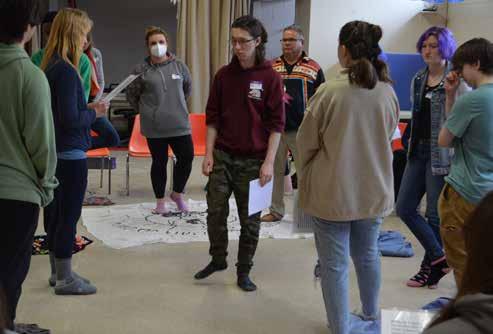
3 minute read
The weight of love
BY THE REV. STEVE SILVERTHORNE

Advertisement

Independence is one of the most important values of our age and shapes our idea of what it means to be a moral person. Part of being moral is acknowledging others’ independence and avoiding imposing on them or restricting their free choices. Thus, it’s not surprising that independence has emerged as one of the most resonant themes in our current discussions about Medical Assistance in Dying (MAiD). We don’t like the thought of burdening others, and when we suffer, we fear demanding more from our loved ones than they can handle. Part of MAiD’s appeal is that it seems to offer the dying a chance to relieve their families of burdens too great to bear. Wouldn’t we rather leave our loved ones with happy memories from our good times together, instead of the memory of our anguished suffering?
That is a powerful sentiment and one that can arise out of a deep love for those around us. Yet I worry that in the midst of our emphasis on independence, and on sparing others from burden, we may forget that burdening others is not always wrong. In fact, the most important relationships in our lives aren’t ones that prioritize autonomy. They are places where we lay heavy burdens on others and where we learn to accept heavy burdens from them. For me, this is most true in my family relationships. In these, my joys and freedoms are often tempered by the sorrows and unexpected demands laid upon me. Yet it is a way of life I would never forsake.
I am the father of four girls. From their first cry, I have been reminded regularly of the weight of responsibility I bear for them. Months of sleeplessness while they squirmed with colic, nights of paralyzing fear as they struggled through a serious lung infection, and the indignities of cleaning up vomit when they have been overcome with illness in their sleep have all intruded on my life in unwelcome ways. Added to this are the many lesser challenges which try my patience. Demands for attention when I am busy with work, piano recitals which push my tolerance to its breaking point, and complaints about the quality of my cooking leave me struggling to appreciate the joys of family life.
As a result, one of the most difficult challenges in parenting has been to accept these unwelcome demands without resentment. Through all these encumbrances, my mind often recites the things I would rather be doing and often highlights the unreasonableness of their needs. Their needs, great and small, impose on my independence. That weighs heavily sometimes. Yet this is also where the value of family shines through. It is a place where I know I am needed, and where I find meaning in responding to the claims my loved ones make on me. The value of bearing their burdens has not been an easy lesson to learn, but learning it has seen me through many seasons of hardship and despair. They need me, and that need reminds me of my true worth.
I hope that this is a lesson my children are learning as well. As the years progress, they are growing steadily into adulthood and are less
Convenient water station installed for Cornwall day program visitors
Participants at Centre 105 in Cornwall, Ont. are enjoying using a new Elkay Water Bottle Refill Unit/Drinking Fountain recently installed in Trinity Anglican Church. The City covered the entire cost of the water unit and its installation (about $10,000) as part of an initiative to reduce the amount of single-use plastics entering the landfill.

needful of my help. At the same time, I am growing more needful of theirs. I fear burdening them as I age and fear the self-doubt that will come when I start reaching out for help with more frequency than I (or they) think reasonable. Yet I hope that this will not stop me from doing it.
Like me in my parenting, they in their care for me will face unexpected and perhaps agonizing challenges to their independence. They may face hard choices and wearisome hours which they will find hard to bear. But they will also, by God’s grace, learn the value of being depended upon by someone they love. In this, the burden of caring for me in my dying, though painful and unwelcome, will be a gift.
We cannot ignore the challenges that MAiD brings us. Its reality should stir compassion for the profound anguish families go through when their loved ones suffer. But it should also stir us to ensure that the vulnerable and the dying are never left feeling ashamed or embarrassed by their needs. Their need for care, attention, and love is not special pleading. These are not unfair burdens laid on those close to them. They are instead a call for us to fulfil our responsibility to honour someone made in God’s image and an opportunity for us to learn the value of being needed.








